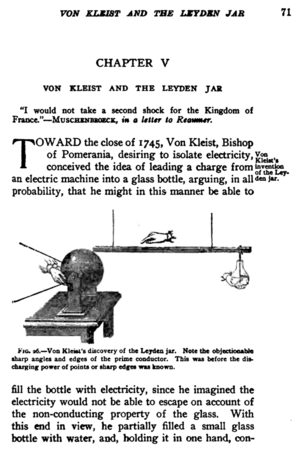
Ewald Jürgen Georg von Kleist
Encyclopedia

Germany
Germany , officially the Federal Republic of Germany , is a federal parliamentary republic in Europe. The country consists of 16 states while the capital and largest city is Berlin. Germany covers an area of 357,021 km2 and has a largely temperate seasonal climate...
jurist
Jurist
A jurist or jurisconsult is a professional who studies, develops, applies, or otherwise deals with the law. The term is widely used in American English, but in the United Kingdom and many Commonwealth countries it has only historical and specialist usage...
, Lutheran cleric
Lutheranism
Lutheranism is a major branch of Western Christianity that identifies with the theology of Martin Luther, a German reformer. Luther's efforts to reform the theology and practice of the church launched the Protestant Reformation...
, and physicist
Physicist
A physicist is a scientist who studies or practices physics. Physicists study a wide range of physical phenomena in many branches of physics spanning all length scales: from sub-atomic particles of which all ordinary matter is made to the behavior of the material Universe as a whole...
.
A member of the von Kleist
Von Kleist
Von Kleist is a Pomeranian Prussian noble family. Notable members of this family include:* Ewald Jürgen Georg von Kleist ; co-inventor of the Leyden jar* Ewald Christian von Kleist ; German poet and soldier...
family, Ewald was born in Vietzow
Wicewo
Wicewo is a village in the administrative district of Gmina Tychowo, within Białogard County, West Pomeranian Voivodeship, in north-western Poland. It lies approximately south-west of Tychowo, south-east of Białogard, and north-east of the regional capital Szczecin.Before 1945 the area was...
in Farther Pomerania
Farther Pomerania
Farther Pomerania, Further Pomerania, Transpomerania or Eastern Pomerania , which before the German-Polish border shift of 1945 comprised the eastern part of the Duchy, later Province of Pomerania, roughly stretching from the Oder River in the West to Pomerelia in the East...
. He studied jurisprudence
Jurisprudence
Jurisprudence is the theory and philosophy of law. Scholars of jurisprudence, or legal theorists , hope to obtain a deeper understanding of the nature of law, of legal reasoning, legal systems and of legal institutions...
at the University of Leipzig
University of Leipzig
The University of Leipzig , located in Leipzig in the Free State of Saxony, Germany, is one of the oldest universities in the world and the second-oldest university in Germany...
and the University of Leyden and may have started his interest in electricity at the latter university under the influence of Willem 's Gravesande
Willem 's Gravesande
Willem Jacob 's Gravesande was a Dutch philosopher and mathematician.-Life:Born in 's-Hertogenbosch, he studied law in Leiden and wrote a thesis on suicide. He was praised by John Bernoulli when he published his book Essai de perspective. In 1715, he visited London and King George I. He became a...
. From 1722-1745 he was dean of the cathedral at Kammin
Kamien Pomorski
Kamień Pomorski is a town in the West Pomeranian Voivodeship of northwestern Poland. The capital of Kamień County, the town had 9,129 inhabitants as of June 30, 2008.- History :...
in the Kingdom of Prussia
Kingdom of Prussia
The Kingdom of Prussia was a German kingdom from 1701 to 1918. Until the defeat of Germany in World War I, it comprised almost two-thirds of the area of the German Empire...
, after which he became president of the royal court of justice in Köslin
Koszalin
Koszalin ; is the largest city of Middle Pomerania in north-western Poland. It is located 12 km south of the Baltic Sea coast. Koszalin is also a county-status city and capital of Koszalin County of West Pomeranian Voivodeship since 1999...
.
On 11 October 1745 he independently invented the Kleistian jar, more commonly known as the Leyden jar
Leyden jar
A Leyden jar, or Leiden jar, is a device that "stores" static electricity between two electrodes on the inside and outside of a jar. It was invented independently by German cleric Ewald Georg von Kleist on 11 October 1745 and by Dutch scientist Pieter van Musschenbroek of Leiden in 1745–1746. The...
after 's Gravesande's graduate student Pieter van Musschenbroek
Pieter van Musschenbroek
Pieter van Musschenbroek was a Dutch scientist. He was a professor in Duisburg, Utrecht, and Leiden, where he held positions in mathematics, philosophy, medicine, and astrology. He is credited with the invention of the first capacitor in 1746: the Leyden jar. He performed pioneering work on the...
of Leyden.

